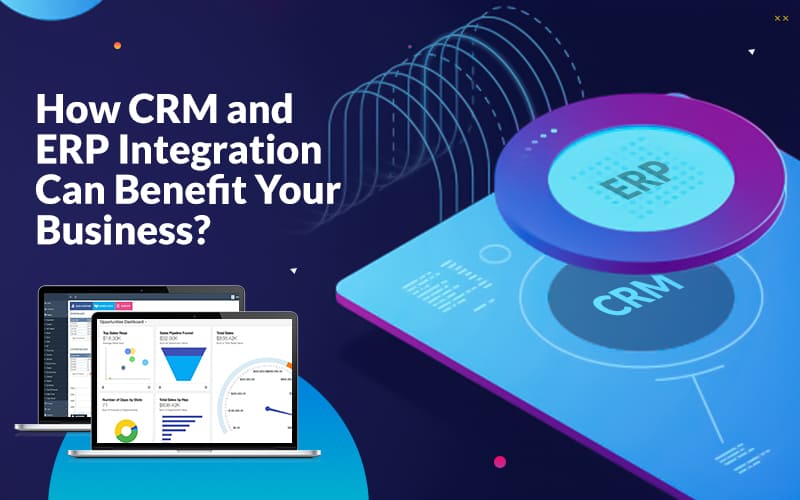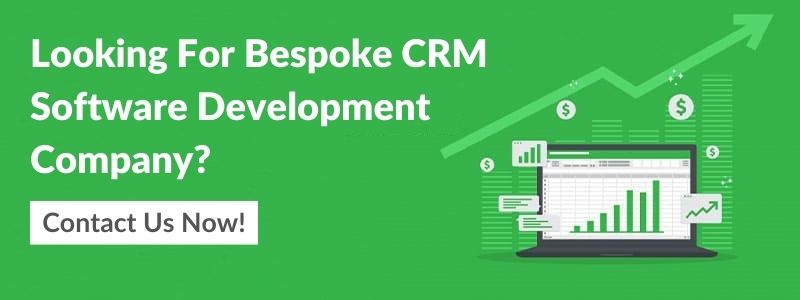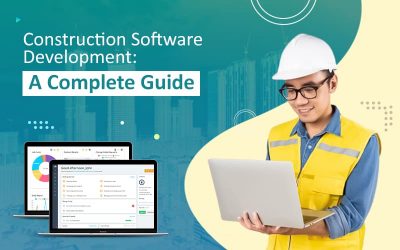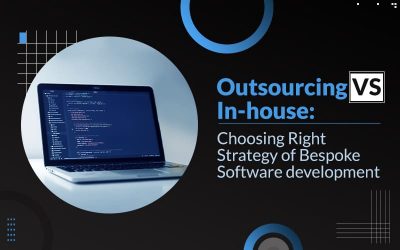How CRM and ERP Integration Can Benefit Your Business?
In an ever-growing competitive world, businesses are continually looking for ways and are coming up with better software to manage their customers efficiently. While being customer-driven, the businesses are also striving hard to be profitable and thus are inclining towards CRM and ERP integration solutions.
CRM (customer relationship management) and ERP (Enterprise Resource Planning) integration is an increasingly popular approach that aims to improve work processes and streamlines flow. Cloud-based CRM system integration results in a more effective sales and marketing analysis along with cost optimisation. CRM integration can also deliver higher operational efficiency and improved collaboration of the organisation members.
Let’s start by talking about,
What are CRM and ERP integration?
Even though CRM and ERP integration are both used to enhance business productivity, there is a slight difference in their work.
While CRM software manages the customer interaction with a business and manages the customer data efficiently within the spreadsheets and files. On the other hand, ERP focuses on material requirement, which lets the manufacturers manage the resources or materials required to operate business smoothly.
So, the primary difference lies in revenue and profits, but most businesses focus on both – increasing revenue and excellent profits. Owing to the needs and through reformations over time, the CRM and ERP developers began to combine the two under one umbrella that is collectively known as customer relationship management.
Interestingly, the trend of integrating bespoke CRM software development into the business is ever-growing. This comprehensive picture of the customer data gives you a more reliable analysis of critical data, including sales and marketing campaigns and help you with further predictions with greater visibility of KPI.
We can further break it down by saying that ERP software helps smooth and continuously function the organisations, whereas CRM solutions make customer interactions better and grow revenue.
Recommended Read – Salesforce vs HubSpot: Which is the best CRM software you should choose?
And talking about the difference will make them more straightforward.
What is the difference between CRM and ERP?
While the overall growth and success of the organisation depend upon the amalgamation of CRM and ERP software, some key differences highlight the importance of their individual role.
The fundamental difference between CRM and ERP is that the former is the front office, and the latter is at the back office. Moreover, the ERP is mainly for the shared databases that include ledger, account receivable and payable, payroll and financial data. At the same time, the CRM takes care of customer services and handling.
Some ERP systems come with a CRM component to make it simpler for businesses, but the CRM software systems do not include ERP components.
|
CRM |
Common Features |
ERP |
| Call centre |
Salesforce automation |
Accounting |
| Customer services |
Marketing automation |
Human resources |
| Community management |
– |
Manufacturing |
| Social media management |
– |
Supply chain |
| Digital marketing |
– |
Project management |
Now that you know about the fundamental differences between CRM and ERP, let’s talk about the advantages of CRM and ERP.
Benefits of CRM and ERP Integration
Automation systems like ERP and CRM help the business in multiple and focus on enhancing their productivity by reducing the manual workload. They can automate the processes like customer data, customer monitoring, financial data handling and accurate sales.
Apart from these significant benefits, the CRM and ERP integration benefits your business by,
1. Offering a precise inventory status
To provide accurate quotes and precise shipment dates to maintain a smooth workflow, the salespeople of an organisation need to have real-time access to the inventory. The knowledge of inventory levels and current product availability with the pricing is the key to attract customers and drive your business growth.
2. Helping in understanding user behaviours and trends
Addressing and fulfilling customer requirements are the vitals for any business to improve. With the help of ERP and CRM software, your team members will be able to view complete information of the customers, including the order history, status of the calls and current orders, which will help them identify customer needs and offer the correct products based on their requirements.
3. Making room for sales opportunities
According to the order history of the customer and the reviews, the salespeople can quickly get the hang of customer needs that the AI boosts and offer solutions such as predictive analytics. This helps the salespeople of your organisation to leverage the benefits of machine and AI to automate the process and shoot the target recommendations to customers.
4. Providing Efficient financial analysis and predictions
The combination of ERP and CRM is an excellent way to predict the demand and analyse the current data. It helps you prevent excess inventory and leave little or no room for being short on customer needs. Custom ERP software development let you plan according to the user trends and help you makes better predictions to boost customer satisfaction.
5. Letting you offer a Personalised customer experience
With a 360 visibility of the customer requirements, the CRM and ERP allow your business to interact more customised to the clients. After understanding the client need, you can even create a self-service portal which will ultimately be a path to gain loyal and targeted customers.
6. Increasing the business productivity
With the help of bespoke CRM solutions crafted specifically for your business, many processes will be automated and streamlined, such as customer data entry, maintaining the records, analysing the sales etc. The automation will free your manual workforce and allow them to focus on other things related to business.
7. Offers a cost-effective solution
The ERP systems with CRM features is your best bet if you have a start-up business or are looking forward to a cost-effective solution for your business needs. Opting for custom software development will help you cut down the cost and give you a unified solution without being heavy on the pockets.
Moving on to the things you need to include in your CRM and ERP software,
Main features of the CRM and ERP software?
Integrating the two most potent software into your business will deliver value, but you must know about the critical features before opting for CRM software development. Here is a list of the most common features to include in the ERP or CRM systems to enjoy seamless automation throughout your business processes.
ERP features
1. Financial Management/Accounting
Helps in managing the records of payments and reduce the chances of errors by automating the data entry. Also, it helps take care of the accounts by maintaining a well-defined ledger that anyone in the organisation can access.
2. Order and production Management
It is important to keep an eye on the inventory to avoid shortage and avoid an unnecessary pile-up. The real-time information about the orders will help the salespeople give accurate production and accurate predictions.
3. Marketing insights
Automating the business processes will help you give precise marketing insights and identify the weak areas to improve. Accurate market insights will help you derive future strategies based on the market analysis.
4. Supply-chain management
ERP software lets you keep an eye on every step of the chain. Right from procurement to distribution, the ERP software allows you to keep track of every activity to identify and rectify the issues at any stage.
5. Two-way management
With the help of ERP, the salesperson and manufacturer will stay on the same page and update the information relating to product or sales and access the information with the touch of a finger.
CRM Features
1. Customer data
CRM software eliminates the need for manual data entry and stores every detail of the customer in an organised that can be accessed by all the authorised people of the organisation.
2. Client history
With the help of client history and previous transactions, you can check customer behaviour and need that helps you deliver more customised service.
3. Customer support
As a business, you need to hear what your customers say and provide them efficient solutions according to their query. A customer support platform will build your customers trust in you and helps you gain more clients.
4. Customer self-support
You can even develop a platform where the customers can quickly enter their grievances and issue a ticketing system to address the issues systemically.
Choosing the right CRM portal
We can conclude by saying that by having ERP/CRM integration software in place, you can create a streamlined workflow that increases the productivity of your business and eliminates manual work data entry. Additionally, efficient CRM software can save time reduces the data errors that can ultimately result in client-focused work.
Specialising in an integrated ERP/CRM system, Matellio offers bespoke CRM solutions that fit right to your business needs and helps you achieve strategic marketing goals through innovative solutions. Our CRM developers who will develop custom software solutions according to your and your business needs.
Get in touch to know more about the CRM ERP integration and build loyal customers with efficient customer handling through software.






